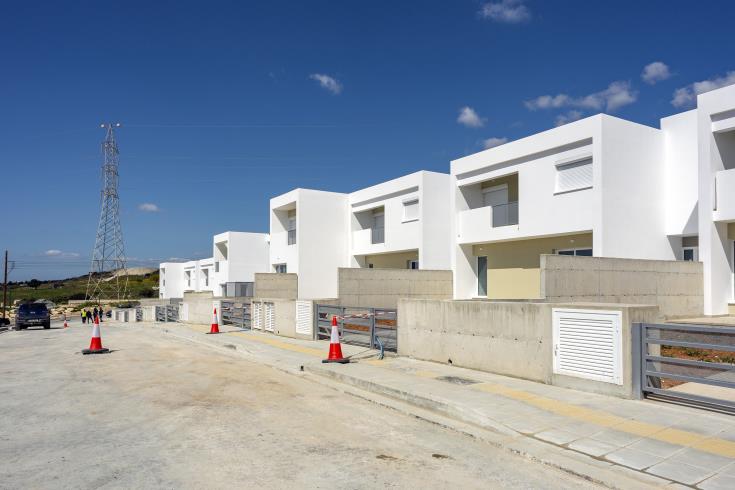MPs are undecided on whether to pass a European Union directive reducing the size of homes entitled to lower 5% VAT or face hefty financial penalties, while the construction industry wants authorities to ignore it.
Arguing the VAT change will endanger the economy’s recovery, a group of small developers and services providers based in Paphos urged MPs not to incorporate the directive into national law.
Despite being an EU directive, they argue Cyprus would not be the only EU member not to apply the regulation, as Bulgaria, Poland, Malta, and Germany have different VAT regulations ranging from zero to 5% for homes.
Under the directive, member states are obliged to introduce legislation of 5% VAT on homes up to 140 square metres.
The Finance Ministry submitted a bill which pushes the limit a bit higher.
In Cyprus, the reduced rate of 5% VAT applies for homes up to 200 sqm of buildable area.
The cabinet has already agreed upon the directive and needs parliamentary approval.
According to Finance Ministry spokesperson George Panteli, a home of more than 170 sqm under the new law gets the standard 19% VAT for every square metre over the limit.
But a home covering more than 220 square metres would not be eligible for the lower VAT rate of 5% and instead incur 19% for the whole project.
Currently, this is applicable for homes over 275 square metres.
Regarding flats, only the first 90 square metres of an apartment covering a maximum of 110 square metres will be taxed at 5% VAT.
The proposed legislation provides a short grace period ending in November.
Representing the group urging the parliament to reject the EU directive, Leondios Hadjivasili of Hadjivasili Bros Developers told the Financial Mirror that stakeholders feel that Brussels was taking Cyprus on a bumpy ride.
“We need to be clear on this.
“The proposed VAT law on housing will essentially mean the end of Cyprus’ construction industry, just as it’s beginning to recover from the fallout of the golden passport scheme,” said Hadjivasili.
He acknowledged the issue arose from the misuse of the previous law on housing by investors who took advantage, buying high-end property but paying small amounts in taxes.
As argued, Malta, Portugal, Bulgaria, Germany and Greece apply zero VAT to purchase a primary home.
“The industry now depends on local buyers, mainly young couples looking to buy a home.
“With the new law, the dreams of young couples fade to dust, along with the hopes of reviving the industry”.
Why Cyprus?
Hadjivasili argued that MPs should be looking to see what applies in other EU countries and go back to the EU demanding answers as to why other states have gotten away with similar or no VAT on housing.
“MPs have to make a strong reference and comparison with the other European countries, which in their majority have a zero VAT rate,” said Hadjivasili.
He said the stakeholders do not understand the purpose of lowering the price for introducing VAT.
Regarding houses, the cut-off price is set at €350,000, meaning that any dwelling sold at a higher price cannot benefit from any reduction in VAT.
“Even worse, the cut-off price for flats is €200,000.
“With construction costs shooting up by almost 30% in the past couple of years, with the war in Ukraine pushing costs even higher, what developer will be selling apartments for less than €200,000?”
The group proposes that no VAT is imposed on flats under 110 square metres bought as a primary home.
For flats bigger than 110 square metres and up to 130 sqm, the first 110 should be taxed with 5% and the rest with 19%.
For houses, as the group suggests, 5% VAT should be imposed on the first 200 square metres of homes up to 230 sqm. Homes above 230 square metres should be taxed at a full 19%.
“It’s the timing as well.
“This comes amid the crisis created by the war, the coronavirus pandemic, and Cypriots used as guinea pigs in 2013 when authorities along with EU creditors forced Cypriots to bail out the banking system.
“For this reason alone, Cypriots should be given an exemption,” argued Hajivasili.
In earlier comments to the paper, the chair of the Technical Chamber of Cyprus (ETEK), Constantinos Constanti, said that a couple building a home of 201 square metres would be paying an additional €42,000.
“As things stand today, the average cost of building such a home would be around €315,000, with the VAT due amounting to €15,000.
“Should the directive be adopted, then couples will be called to pay €42,000 on top of the initial €15,000,” said Constanti.
He argued that tweaking VAT legislation on housing would see many couples postpone their dream of owning their own home.
“Young couples have limited choices, as renting costs have gone through the roof.
“Renting a decent flat in Limassol for a family costs anything from €1,000 to €1,500, while in Nicosia, rents start from €700.”
The Scientific Technical Chamber of Cyprus (ETEK) is the statutory technical adviser of the state and an organisation for Cypriot engineers.
Parliamentary sources told the Financial Mirror that the EU might reject the bill tabled by the Finance Ministry.
They said MPs are split over what action they should take, with opposition parties very wary over their next moves on the matter.
“The EU has even said it would hit us with a lawsuit before the EU Court of Justice.
“They are on our case because the state had reduced VAT even for properties bought by affluent citizens or foreign investors who bought high-end homes and apartments,” said a source.
If Cyprus fails to incorporate the EU directive on VAT on properties, it could have to pay millions of euros in fines.
“This complicates things further because a ‘no vote’ could increase the state budget, which the parliament has no authority to do.”










